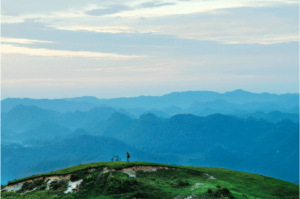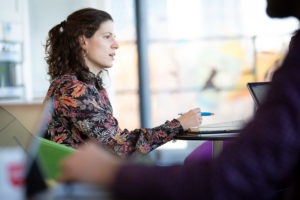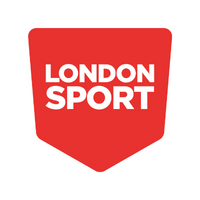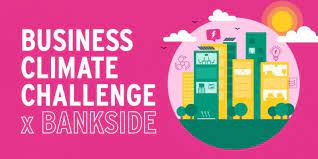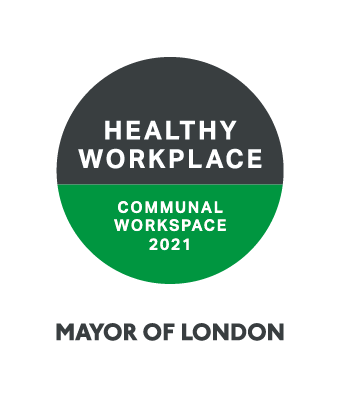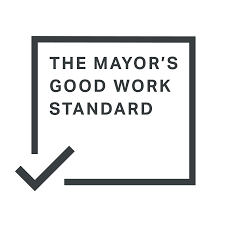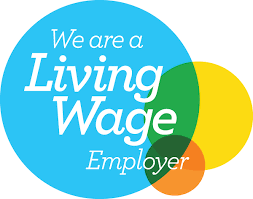What could be better than getting outside in the great outdoors, exploring nature, breathing in the fresh air?
It is early on a Saturday morning. Darkness still clinging to the edges. The trees outside the window exist only as outlines. Barefoot in the kitchen, waiting for the kettle to boil so I can make coffee. That all important cup of joe before a run.
I pace the kitchen, anticipating the mud, trying to make the coffee last a bit longer.
The trails await.
Am I asking the question will I be welcome here? Do I have the right to slip and slide up and down these way-marked routes? Will I encounter disapproval and a sense that I do not belong?
These questions do not cross my mind. And when it comes to the ‘great outdoors’, should they really be things that cross anyone’s mind?
To be totally honest and transparent, the idea of racism and barriers to access trail running communities and outdoor spaces had never been something that crossed my mind. Trail running and getting out into the countryside, for me, represented freedom, escapism. In my ignorance, I’d always imagined these spaces to be fully inclusive, available to all and removed from the trappings of exclusion and discrimination experienced in so many other parts of society.
But there is an undercurrent of deeply embedded racism running through the lanes of this country dating back to the days of land ownership, colonialism and the very founding of environmental organisations.
The outdoors is for everyone but that is not the message portrayed in the media. Outdoor activities are not marketed in the mainstream to diverse groups and underrepresented communities.
The outdoor activity narrative being presented is predominantly white and more often than not, male; these are the stories being told. But did you know that in 2019, over 50% of women applying for permits to climb Everest were non-white?
A report from Natural England highlights the disparity in visits to the natural environment. Just under 60% of white people stated they visited the natural environment at least once a week, compared to 40% of people from all other ethnic groups combined. Ethnic minorities represent only about 1% of visitors to National Parks with a very small percentage of black, asian or people from minority ethnicities on National Park and Area of Outstanding Beauty boards. There is also a much higher percentage of white people living in rural areas that can further compound the feeling that the countryside is a white space. A regional ethnic diversity report shows that 98.2% of people from black African backgrounds are likely to live in urban areas.
Being a trailblazer is challenging. It takes guts and determination to do things differently. Putting yourself in environments and situations where you are the only one that looks like you, takes courage. It is very hard to aspire to do something that you cannot see.
But two driven individuals are doing just that. Here are their stories.
Ultra Black Running
Founder, Dora Atim
Tell us a bit about your background; who you are, what you do and how you got into running?
Hi, my name is Dora Atim, I am a running coach. I also coach young children in sports and am a youth mentor. I got into running when I started to get more experienced in boxing, my coach mentioned that running would help me progress. I grew to love the sport massively, a few marathons and two ultra-relays under my belt, I am now a running coach and run a community for black women and Non-binary and gender nonconforming to get into trail running.
What led you to setting up/starting Ultra Black Running?
Being in lockdown, and experiencing the rise of the Black Lives Matter movement, this sparked a lot of past trauma and anxiety about my lived experiences and running quickly became my therapy tool. As I was staying in the countryside at the time, I had access to several country parks and trails. I really enjoy listening to House music and just letting loose in the trails and the spark of loving running came back to me. I had been disappointed that I was not able to run my first ultra as planned and my intentions and perspective of what the trails do for me changed. Running through the trails became something so amazing and whilst it was a brilliant lifestyle change for me, I wanted to share the absolute joy I felt by being at one with nature.
What do you think are the barriers to more diversity within the outdoors and the trail running scene? Is it access to the environment or is it more complicated than that?
The barriers that non-white people face in the trail world is a lot more complicated than representation. However, when it comes to accessibility and trail running, I feel that there seems to be an official etiquette on the trail running scene and also people of colour are rarely seen or noticed in the outdoors. Before I started trail running and visiting other trails, I always was nervous as it seemed like an activity that only shows or is open to only white people. I think that the trail running scene needs to be redefined as something that is accessible to all without the feeling of there being an official ‘etiquette’ guide or rule book on who can access these. I also feel like there is a ‘gate-keeper’ approach sometimes, I experienced this a few times a week when I started trail running, I would often get stopped and asked what I am doing, by other people who are walking dogs…
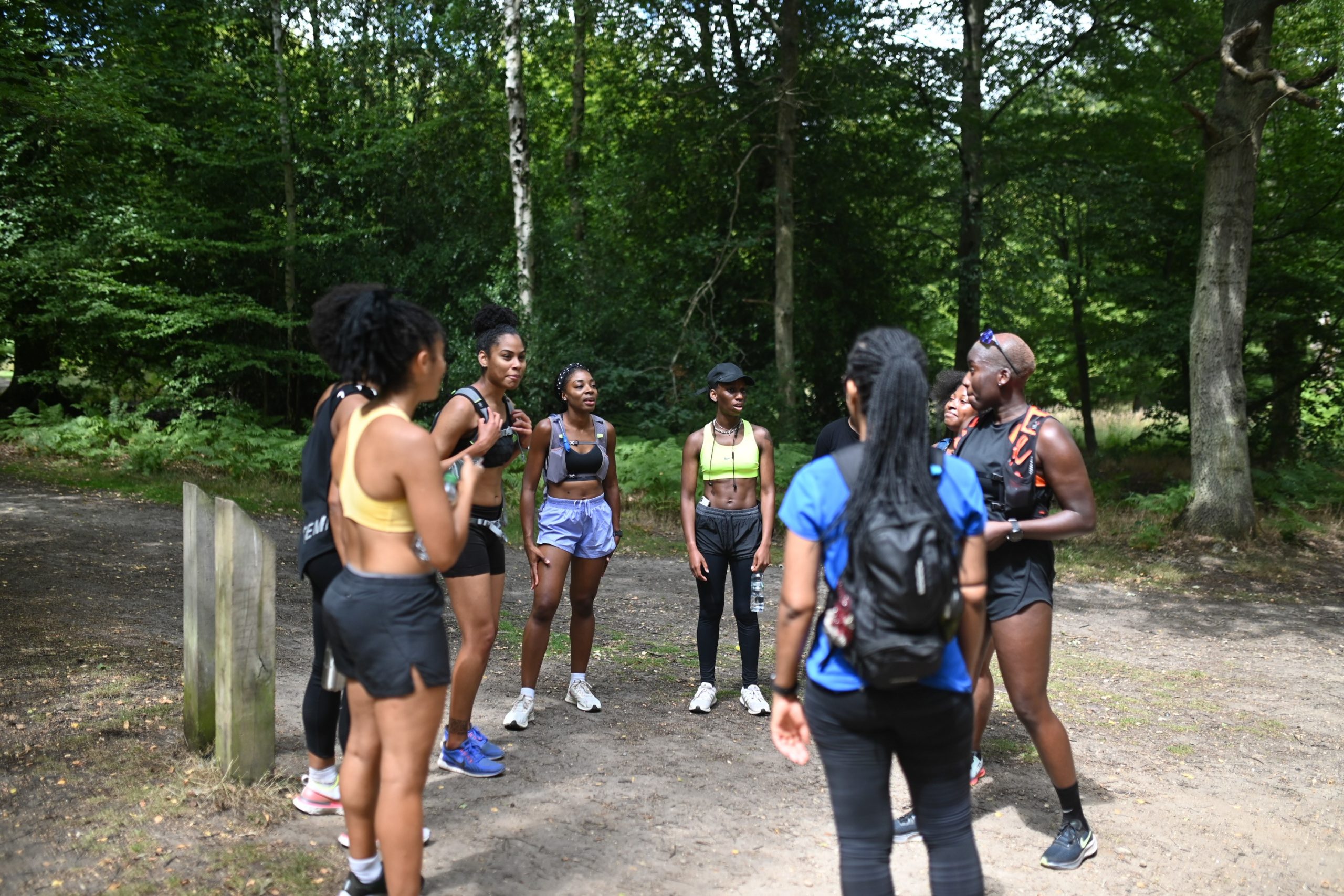
Ultra Black Runners, photo credit @simonrphoto 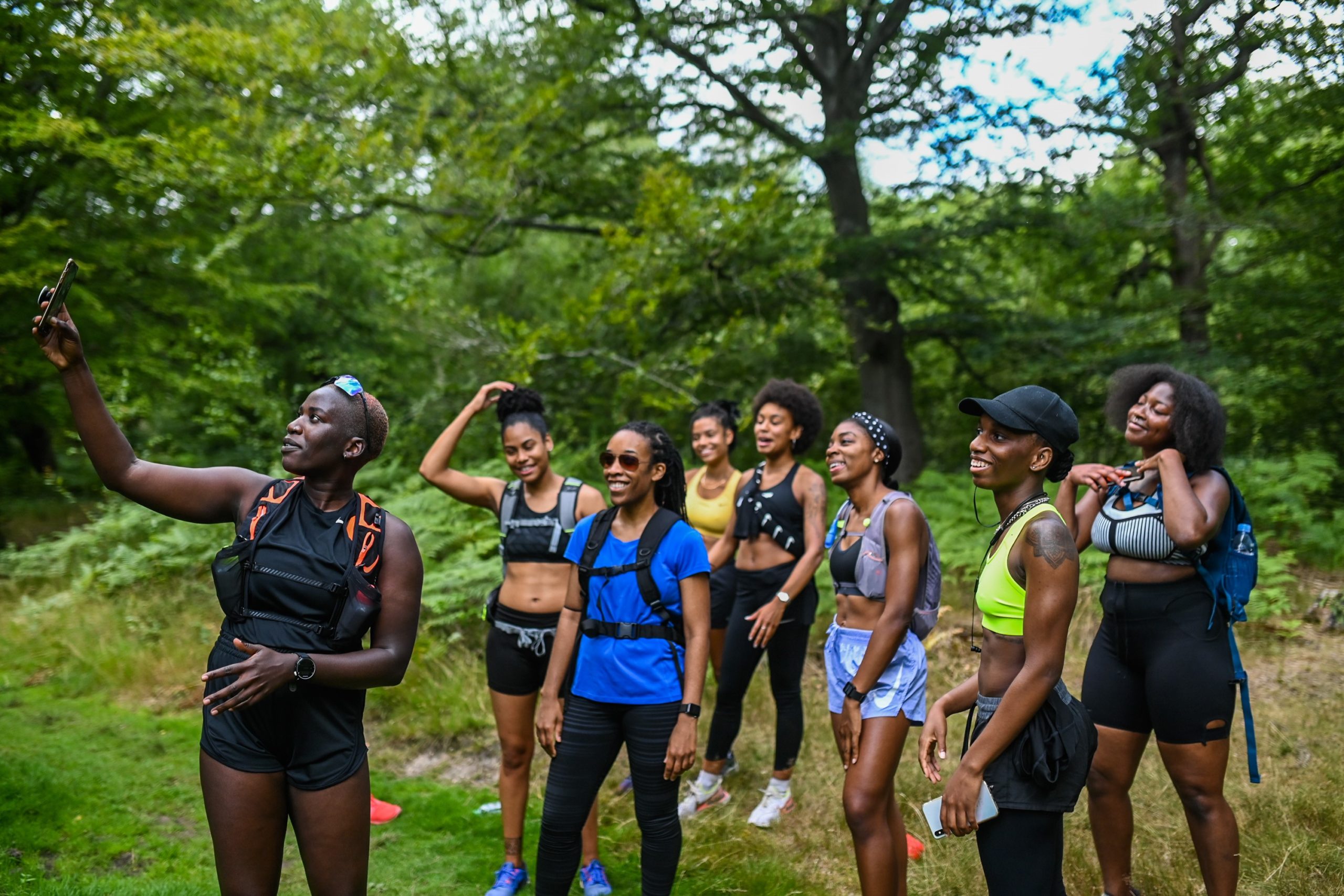
Ultra Black Runners, photo credit @simonrphoto
What can be done to increase representation and diversity on the trail running scene? What do people working in the industry need to do to make a difference?
There is still a long way to go in order for there to be more representation in the trail scene, however I find that spaces like Ultra Black Running are super important in getting more black people into the trails in a setting that is more relatable and comfortable for them. This will hopefully build the confidence to eventually start to access trails and events independently, whilst feeling a sense of belonging. I think that event organisers or other community leaders who are not aware of the barriers that black people face, will need to be listened to first in order to understand and also hopefully be a part of making a change and driving towards the outdoors becoming much more diverse and accessible.
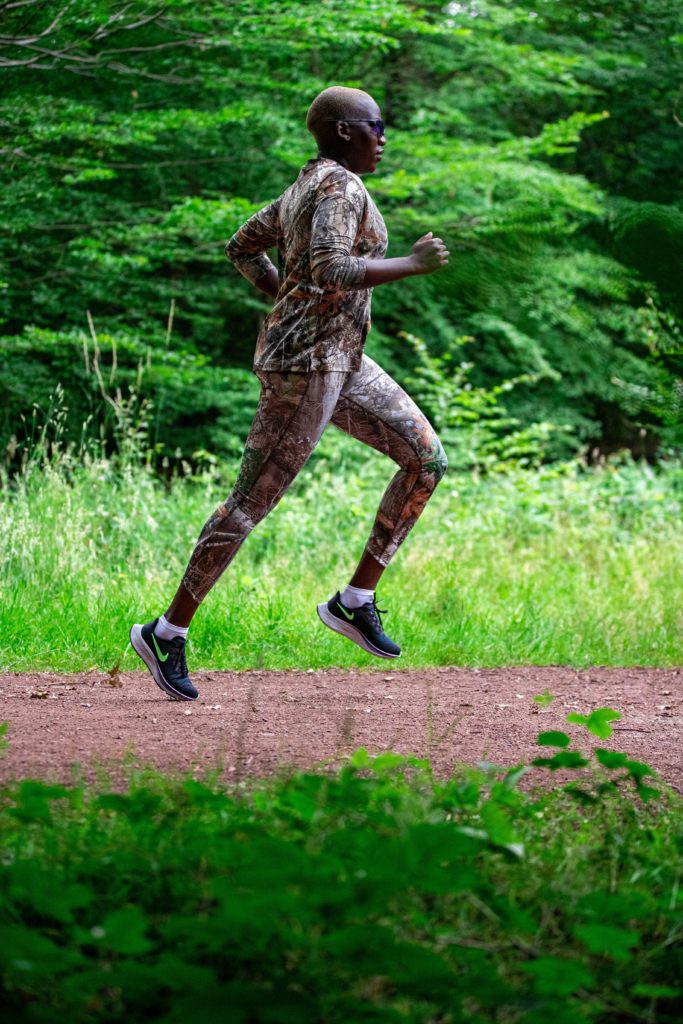
What is your hope for Ultra Black Running in the future? What’s next?
At the moment, my hope for Ultra Black Running is to get more black women and non-binary and gender nonconforming people to the starting point, giving the tools and confidence to make that very first step to running through the trails. Some of the Ultra Black members are already training towards their very first trail race which is exciting!
Connect with Dora on Instagram @doradontexplore and @ultrablackrunning
Black Girls Hike
Founder, Rhiane Fatinikun
Tell us how you got involved in exploring the outdoors? What has been your experience of getting active outside?
I used to work in the civil service, and I used to do a lot of community work and volunteering and I’ve always been really into building community.
At the beginning of last year, spur of the moment, I decided that I wanted to take a hike. I’d been on the train going through the Peak District, watching people getting off to go on hikes. I started thinking, what can I do this year as a hobby that will increase my well-being. I thought, I’m going to take up hiking.
I live in Bolton, near the West Pennines so there is loads of walking routes around me and we are not far from the Lake District and the Peak District.
What led you to set up Black Girls Hike?
I set up Black Girls Hike because I wanted to create a space where black women could explore. The outdoors is seen as a white middle class place and if you’ve not got any experience in the outdoors or been exposed to it through your childhood or education then it is going to be something alien to you. When I was growing up, I could never think of a black hiker, I didn’t see anyone who looked like me doing that. Sports like football, basketball and athletics have black representation, so people see that and think, yes, that is attainable. Black people are not represented in the hiking industry. We started the group in Manchester and would get messages from all over asking if we were going to start hikes in other parts of the country. We started a group in the Midlands and in London and had over 100 people turn up for our first London walk. It just goes to show how many people want to get outdoors and enjoy it as a safe space.
What do you think are the barriers to more diversity within the outdoors?
Representation is obviously important. You don’t see black people doing this kind of stuff. The industry has started using black and brown faces in marketing campaigns, but it seems inauthentic. These organisations are made up of white, middle-class people who are making the decisions. We really need to see some change within these organisations, people that understand, with black people in real positions of power that can make a difference.
It is not enough to appoint a black person to a position of power as a nod to diversity and representation without equipping them with a workforce who are not resistant.
Soft skills and education also important. If you weren’t taught anything about the outdoors in school and you don’t have navigation experience, then that’s going to be another thing that’s going to stop people getting outside.
The industry needs to listen to the voices of grassroots organisations and not generalise them. We are all put under this BAME banner at the moment, but we are not all the same. There needs to be an individualised targeted approach because everyone has different needs, there is not a one size fits all solution. Be more mindful of the groups that you are approaching so that they feel like you are trying to engage with them rather than just trying to tick a box. People want to make things look a certain way and not really confront the issues.
Has the recent Black Lives Matter movement and protests had an impact on the work you do?
Conversations are happening and people are reaching out
But we are not a new organisation, black people are not new and black oppression is not a new thing. We’ve been tackling this for years. We don’t need token gestures; we’re asking you to make systemic structural change.
Yes, I set up a black girls hiking group but I am not the voice of black people. Black people in the UK have loads of different experiences. I grew up in a semi-rural space that’s going to be totally different from someone that’s in grown up in a city. We need to hear loads of different voices.
Black Girls Hike Healing Retreats https://t.co/UT8O1e9cNb
— Black Girls Hike UK (@UkBgh) June 10, 2020
What is your hope for Black Girls Hike in the future?
I want to get more diversity and inclusion in outdoor leadership. I went to do an outdoor first aid course and the instructor was black; I still can’t believe that he was a black instructor because he is the first one I’ve ever had!
I want to make accessing the outdoors easier for people from a young age through education, providing training opportunities and really promoting the message that the outdoors is pretty amazing and so good for your physical and mental health.
What is the best thing about hiking and getting out into the great outdoors?
The sense of adventure and the chance to discover new things. It has made me more confident and like I can do anything.
Favourite place to go hiking?
The Lake District. On your way in, you just see like all these scenes unfold in front of you. It is so beautiful and I’m always so excited to be there, I’m really grateful its so close, I could never get bored of it.
Support the work of Black Girls Hike by contributing to the gofundme campaign, supporting healing retreats for women to explore the outdoors in a safe space.
Connect with Rhiane on Instagram @bgh_uk and Twitter @UkBgh
The benefits of getting active outside in nature for both physical and mental health are something that everyone deserves to experience. Be pro-active in support, listen and make space.


